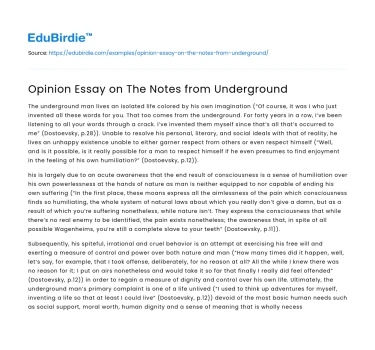The underground man lives an isolated life colored by his own imagination (“Of course, it was I who just invented all these words for you. That too comes from the underground. For forty years in a row, I’ve been listening to all your words through a crack. I’ve invented them myself since that’s all that’s occurred to me” (Dostoevsky, p.28)). Unable to resolve his personal, literary, and social ideals with that of reality, he lives an unhappy existence unable to either garner respect from others or even respect himself (“Well, and is it possible, is it really possible for a man to respect himself if he even presumes to find enjoyment in the feeling of his own humiliation?” (Dostoevsky, p.12)).
his is largely due to an acute awareness that the end result of consciousness is a sense of humiliation over his own powerlessness at the hands of nature as man is neither equipped to nor capable of ending his own suffering (“In the first place, these moans express all the aimlessness of the pain which consciousness finds so humiliating, the whole system of natural laws about which you really don’t give a damn, but as a result of which you’re suffering nonetheless, while nature isn’t. They express the consciousness that while there’s no real enemy to be identified, the pain exists nonetheless; the awareness that, in spite of all possible Wagenheims, you’re still a complete slave to your teeth” (Dostoevsky, p.11)).
Save your time!
We can take care of your essay
- Proper editing and formatting
- Free revision, title page, and bibliography
- Flexible prices and money-back guarantee
Subsequently, his spiteful, irrational and cruel behavior is an attempt at exercising his free will and exerting a measure of control and power over both nature and man (“How many times did it happen, well, let’s say, for example, that I took offense, deliberately, for no reason at all? All the while I knew there was no reason for it; I put on airs nonetheless and would take it so far that finally I really did feel offended” (Dostoevsky, p.12)) in order to regain a measure of dignity and control over his own life. Ultimately, the underground man’s primary complaint is one of a life unlived (“I used to think up adventures for myself, inventing a life so that at least I could live” (Dostoevsky, p.12)) devoid of the most basic human needs such as social support, moral worth, human dignity and a sense of meaning that is wholly necessary to man’s well-being, livelihood, and personal identity.






 Stuck on your essay?
Stuck on your essay?

